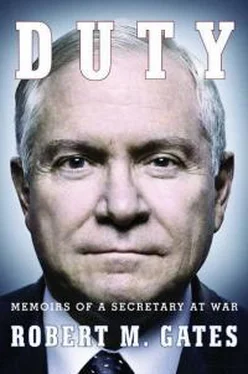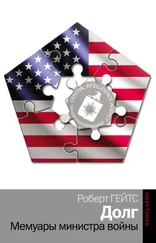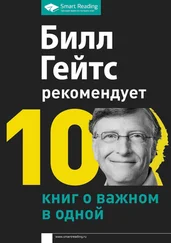Both before and immediately after confirmation, I spent a lot of time thinking about how to approach running the Pentagon, the largest and most complex organization on the planet, with some three million civilian and uniformed employees. Unlike many who assume senior executive positions in Washington, I actually had experience leading two huge public bureaucracies—the CIA and the intelligence community, with about 100,000 employees, and the nation’s seventh-largest university, with about 65,000 faculty, staff, and students. But the Pentagon was a whole other thing. Beyond the sheer monstrousness of the bureaucracy, I would have to deal with the troubled relationship between the civilian leadership of the department and many in the military leadership, and the fact that we were engaged in two major wars, neither of which was going well.
There were a large number of people eager to help me—some days too many. It seemed everyone in the Pentagon wanted to see me or send me briefing papers. I was seriously at risk of drowning in all this, so I was deeply grateful to Deputy Secretary Gordon England, chairman of the Joint Chiefs Pete Pace, and Robert Rangel for protecting me and for channeling people and briefings that I did need to see into a sensible structure. The number of those outside the Pentagon reaching out to offer me advice without wanting anything for themselves reflected the fact that many Washington insiders believed the department was in real trouble and that I had to be successful for the country’s sake. I asked to have dinner with John Hamre, who had been deputy secretary of defense during President Clinton’s second term and had subsequently led the Center for Strategic and International Studies. John’s counsel was really useful. Among other things, he observed that decision making in the Pentagon is “like the old Roman arena—gladiators come before the emperor to battle and you decide who is the winner. Someone needs to make sure the process within the arena is fair, transparent, and objective.”
John made two other comments that would profoundly influence my approach to the job. He emphasized the importance of having advocates both for today’s requirements and for those of tomorrow. I would quickly discover that those concerned with potential tools for future wars far outnumbered, and had far greater influence than, the advocates for today’s requirements. I would become the foremost advocate for getting the troops already at war what they needed. John also made clear the importance of having independent advocates for supply (recruiting, training, and equipping the troops) and for demand (the needs of commanders in the field). Commanders in the field might be limiting their requests for troops, he felt, out of the belief that the number of troops they wanted were not available. As a result, I would insist that field commanders tell me how many troops and how much equipment they felt were required and let me deal with how to get them.
I also turned to Colin Powell, an old friend. I had known Colin for nearly twenty-five years and had worked closely with him during the Reagan and George H. W. Bush administrations. As a career Army officer and former chairman of the Joint Chiefs of Staff, Colin not only knew the Pentagon well but retained many good contacts (and sources) in uniform. I e-mailed one specific request to him: “One place you could help right away is to assure any senior officers you talk to that I don’t think I have all or even many of the answers to tough problems. I am a good listener, and I prize candor above all. I also will respect their experience and their views.”
Of course, I received a lot of advice that I didn’t think was sound, and a lot of back-channel commentary pro and con on many senior civilian and military officials. I heard from many people who were interested in filling positions they thought would be vacated by my anticipated purge of Rumsfeld’s civilian team, and I was advised by several people to appoint my own transition team to oversee all the personnel and policy changes I would undoubtedly make.
Instead, I used the interregnum period to make a critical decision about leading the department that would turn out to be one of the best decisions I would make: I decided to walk into the Pentagon alone, without bringing a single assistant or even a secretary. I had often seen the immensely negative impact on organizations and morale when a new boss showed up with his own retinue. It always had the earmarks of a hostile takeover and created resentment. And of course the new folks didn’t have a clue how their new place of employment worked. So there would be no purge. In a time of war, I didn’t have time to find new people, and we couldn’t afford the luxury of on-the-job training for novices. We also didn’t have time for the necessary confirmation of new political appointees. I kept everybody , including notably Robert Rangel as de facto chief of staff, and Delonnie Henry, the secretary’s confidential assistant, scheduler, and all-around utility infielder. If someone didn’t work out or the chemistry was bad, I would make changes later. Continuity in wartime, it seemed to me, was the name of the game, and I wanted tacitly to express my confidence that the team was made up of capable and dedicated professionals. I would not be disappointed.
I did need to fill one senior vacancy, the undersecretary of defense for intelligence. The incumbent, Steve Cambone, had already resigned. Even before confirmation, I had asked another old friend and colleague, retired Air Force Lieutenant General Jim Clapper, to take on the job. Jim had been the director of the Defense Intelligence Agency when I was director of the CIA. He had subsequently retired from the military and later become director of the National Geospatial Intelligence Agency (NGIA), a clumsily named organization responsible for all U.S. photographic satellites and photointerpretation. Because Clapper had favored a strong director of national intelligence, with real control over the entire intelligence community, including Defense agencies, he had run afoul of Rumsfeld and, for all practical purposes, been forced out of the NGIA job. He had been out of government for only months when I asked him to come back. There had been a lot of criticism in the press and in Congress of the Pentagon intelligence operation, and I was confident that bringing in a man of Jim’s experience and integrity would help correct that situation quickly. I also trusted him completely. He reluctantly agreed to take the job but imposed one condition: I had to call his wife, Sue, and tell her how important it was for him to do this. That was a first for me, but I did it, and Sue was very gracious about my disrupting their lives once again for national service.
As I said, leaving Texas A&M was very difficult for both Becky and me. At the end of my last day in my office, more than ten thousand students, faculty, and staff gathered to say good-bye. The president of the student body spoke, I spoke, and we all sang the Aggie “War Hymn.” There were three commencement ceremonies, at the end of which my duties at Texas A&M were officially done.
We flew to Washington, D.C., on Sunday, December 17, to take up my new duties.
My swearing-in ceremony was at one-fifteen p.m. the next day. Both the president and the vice president were there, as was my entire family. I had asked Supreme Court Justice Sandra Day O’Connor to administer the oath, partly because she had done so fifteen years earlier, when I was sworn in as director of central intelligence. She was unable to do so this time because of travel plans, and so I asked Vice President Cheney to administer the oath. I saw it as a small gesture toward him of friendship and respect. Becky held the Bible my parents had given me on my sixteenth birthday.
Читать дальше












